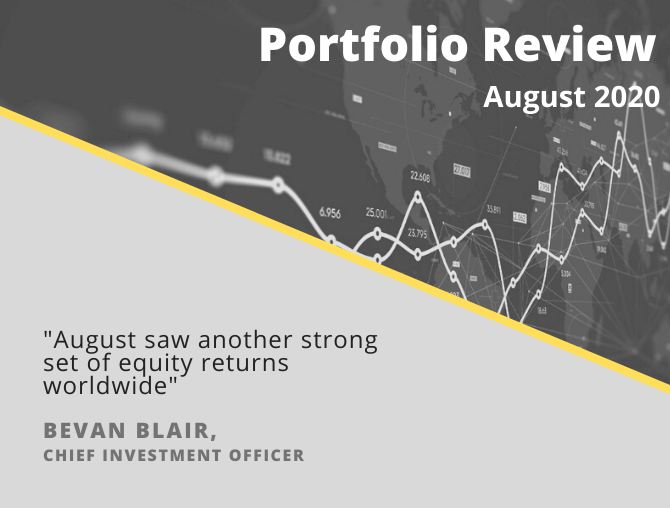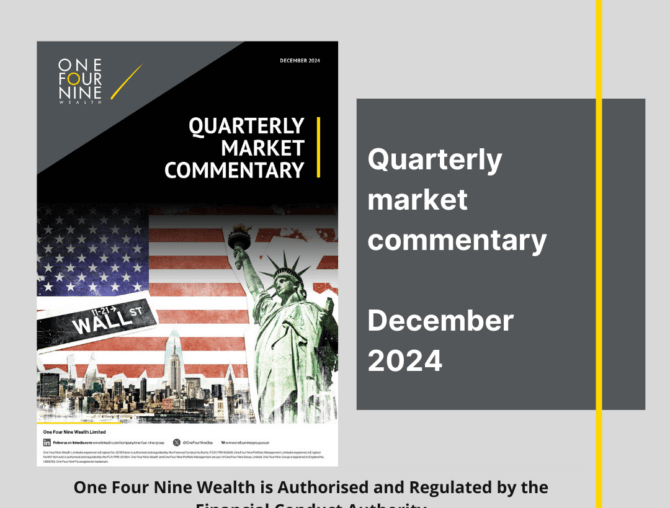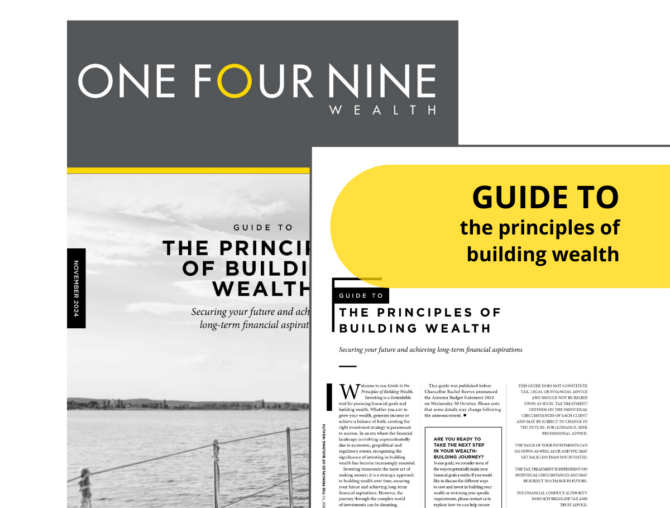
Portfolio Review – August 2020 – Issue 06
This is the latest One Four Nine Portfolio Management (OFNPM) portfolio review providing investors and advisers with an easy to digest overview of what’s happening in the markets globally, alongside comparisons of OFNPM’s portfolio performance each quarter and throughout the year.
Chief Investment Officer’s comments
August saw another strong set of equity returns worldwide.
Led by the US market, which gained 7%, world equities in sterling terms rose 4.6%. The UK, which has lagged all major equity markets this year, saw more modest gains of just under 2.5%.
Bonds witnessed significant falls, with Gilts falling 3.2% and sterling investment grade corporate bonds falling just under 1%. Gold having reached an all-time high of $2,063 per ounce in early August ended the month down 0.4% at $1,967. The greenback continued to weaken falling 2% against sterling and 1% against the Euro. All this would suggest a market, and an economy, doing well. Rising equity prices coupled with rising yields is certainly a “risk-on” environment. And yet we know that, while GDP has bounced back somewhat with a tentative reopening of economies, the economy is still fragile, with high unemployment likely to be a long-term fixture.
It is only strong government fiscal stimulus (you can’t really call it a stimulus when the absence of it would cause a corpse) coupled with further loosening of monetary policy by the central banks that is keeping markets so buoyant.
It certainly isn’t earnings which continue to slide on aggregate, further pushing valuations away from their long-term average. And all of this with a virus that is either still rising in prevalence, or in the case of Europe, having been under control, breaking out again.
The markets
It is worth having a think about what has been driving markets this year to understand why there may be a disconnect between the real economy and market performance.
Firstly, world markets in sterling terms are up 4.2%, but there is a wide divergence of returns between regions. The US market is up 9.7% in dollars (8.6% in sterling). However, all other major markets are still down year to date.
In their local currencies Japan is down 4.1%, Europe 8.1% and the UK a staggering 19.0%. Some Asian markets are up year to date, most notably Korea (+7.4%) and China (+12.5%), although Hong Kong is down 9.4%.
US stocks driving returns
The US market accounts for nearly 60% of world equities by value. It is significantly ahead of the other major markets and is clearly the main driver of returns year to date. The higher your allocation to the US equity market this year, the better your outcome.
There are several stocks within the US market which are driving returns. Apple, Microsoft, Amazon, Facebook and Alphabet (Google’s owner) were all in the top 10 stocks by market capitalisation of the US market at the beginning of year. They accounted for 16.8% of the total market by size. They have all posted significant returns year to date with Amazon up 86.8%, Apple 77.0%, Microsoft 44.2%, Facebook 42.9% and Alphabet 22.0%.
Of the 9.7% return of the US market these 5 stocks account for 9.5%, leaving just 0.2% for the other 84% of the market. The average return of all the other stocks is 0.3%. Still up on the year, but much closer to the other markets. These 5 stocks, thanks to market movements, now account for 23.8% of the market. The driver of the US market has undoubtedly been these 5 tech stocks, along with others which were much smaller at the beginning (Netflix up 64%, Zoom up 377% and Tesla up 496%).
They have clearly been significant beneficiaries, in investors’ minds at least, from worldwide lockdowns, entertaining us, keeping us in contact with friends and family, allowing us to work and communicate from home, delivering our goods which we purchased from their online market places. And their earnings have continued to rise, while others have fallen. The question is whether or not the significant rise in prices are overdone and will they continue to meet the markets expectations of them?
UK stocks – the polar opposite
The UK has been the polar opposite of the US, falling 19.0%.
At the beginning of the year the index was dominated by oil, banks, tobacco, drinks and healthcare stocks. Stocks such as AstraZeneca
(+12.8%), Unilever (+5.0%) and Reckitt Benckiser (+25.7%) have done well, but the market has been dragged down by 2 sectors in particular, oil and banks.
Just 3 companies, HSBC, BP and Royal Dutch Shell accounted for 20% of the market at the beginning of the year. These stocks have suffered significant falls with HSBC down 44.2%, BP 40.7% and Royal Dutch Shell nearly 50%. The 3 account for half the losses of the UK market this year, while the average fall in the UK market has been just under 12% once these have been accounted for.
These older economy stocks have significantly underperformed newer growth stocks. The UK has few of these sorts of companies in its index, but where it has, they have performed similarly. Ocado for instance has delivered a return of 95% this year.
Scepticism
The market does however remain jittery. Volatility is still high with the VIX, a measure of US equity market volatility, in the high 20s. This is not quite double its long-term average but suggests a significant level of scepticism about market levels. It should therefore not come as surprise as an investor to see significant price movements on seemingly inconsequential news. The market is overwhelmingly jumpy and nervous with high valuations.
Portfolio comparison
During August your portfolios posted strong gains which were slightly ahead of their IA sectors.
Year to date the active portfolios are now either slightly up or flat, which compares well to their respective IA sectors that are still in negative territory.
Almost all of our funds posted positive returns in August, with the one exception being the Royal London Short Duration Gilt fund which lost 0.2% (against a Gilt market which fell 3.2%).
Strong performers were Blue Whale Growth fund (+6.4%), Vanguard US Equity (+5.7%), Fundsmith (+4.2%), Londonmetric (+3.4%) and Stewart Asia Pacific Leaders (+2.4%).
Find out how One Four Nine Portfolio Management invest here.
Dr Bevan Blair,
Chief Investment Officer,
One Four Nine Portfolio Management
London, Monday 14 September 2020.
The value of investments and the income from them may go down as well as up. You may not get back the amount you invest. The return may increase or decrease as a result of currency fluctuations. Past performance, or any yields quoted, should never be considered a reliable indicator of future returns.
All data is at 31 August 2020. One Four Nine Models are benchmarked against UK CPI and any other benchmark has been displayed for comparative purposes only and is not a benchmark for the Models. Performance figures are net of underlying fund fees and include One Four Nine Portfolio Management’s Management Fee of 0.24% (including VAT). All model portfolio performance data is sourced from One Four Nine Portfolio Management. All other data is from Bloomberg and Morningstar.
This service is intended for use by investment professionals only. This document does not constitute personal advice. If you are in doubt as to the suitability of an investment, please contact your adviser.
One Four Nine Group Limited Registered in England No: 11866793. One Four Nine Portfolio Management Limited is registered in England No: 11871594 and is authorised and regulated by the Financial Conduct Authority (FCA) FRN: 931954. One Four Nine® is a registered trademark.



